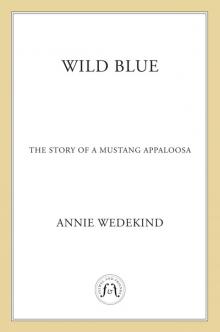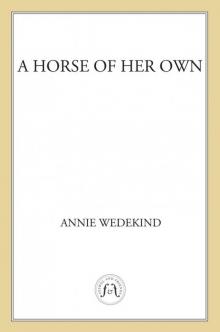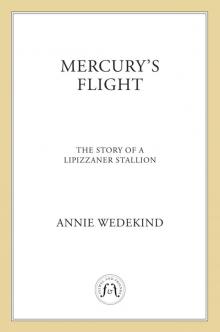- Home
- Annie Wedekind
Little Prince - The Story of a Shetland Pony
Little Prince - The Story of a Shetland Pony Read online
Begin Reading
Table of Contents
About the Author
Copyright Page
Thank you for buying this
Feiwel and Friends ebook.
To receive special offers, bonus content,
and info on new releases and other great reads,
sign up for our newsletters.
Or visit us online at
us.macmillan.com/newslettersignup
For email updates on the author, click here.
The author and publisher have provided this e-book to you for your personal use only. You may not make this e-book publicly available in any way. Copyright infringement is against the law. If you believe the copy of this e-book you are reading infringes on the author’s copyright, please notify the publisher at: us.macmillanusa.com/piracy.
For David
(writ large!)
Dear Reader,
Welcome to the Breyer Horse Collection book series!
When I was a young girl, I was not able to have a horse of my own. So, while I dreamed of having my own horse one day, I read every book about horses that I could find, filled my room with Breyer model horses, and took riding lessons.
Today, I’m lucky enough to work at Breyer, a company that is known for making authentic and realistic portrait models of horse heroes, great champions, and of course, horses in literature. This beautiful new fiction series is near to my heart because it is about horses whose memorable stories will take their place alongside the horse books that I loved as a child.
This series celebrates popular horse breeds that everyone loves. In each book, you’ll get to appreciate the unique characteristics of a different breed, understand their history, and experience their life through their eyes. I believe that you’ll love these books as much as I do, and that the horse heroes you meet in them will be your friends for life.
Enjoy them all!
Stephanie Macejko
Breyer Animal Creations
CHAPTER 1
It’s not an average pony that lives in an apartment building. But then, Dauphin was a far from average pony—at least according to the people who groomed him, fed him, and took him for his daily constitutional in the nearby city park. He saw no reason to disagree with their judgment. His luxuriously thick coat gleamed pale gold like a freshly minted dollar coin and his cream-colored mane spilled down his neck in a rather majestic fashion (if he did think so himself). His dished face, with dark, liquid eyes peering out from beneath a rakish forelock, usually wore a pert, self-satisfied expression that suited him. If perhaps his stomach was a tad on the round side, well, he liked his oats, and there was nothing wrong with a healthy appetite … or with the sugar lumps, apple slices, and peeled baby carrots with which he was regularly treated.
Strictly speaking, Chadwick Ostlers, or “the Chadwick” as the stable was familiarly known, wasn’t an apartment building, though it was tucked in between apartment buildings (the Windsor and the Stratford) on a sunny, tree-studded block in the very nicest neighborhood in the city. With its handsome limestone facade, window boxes bursting with petunias, and impressive—though of course understated—sign (CHADWICK OSTLERS. 1886), the Chadwick was the place where the very best people boarded their horses and ponies. Inside, past the riding ring (admittedly small) and the glass viewing area (where very fit and tanned mothers perched comfortably on hunter green director’s chairs, sipping chai), a ramp rose up to the second story, much in the way an elevator (or, if you were unlucky and didn’t live in a building as nice as the Windsor and the Stratford, a staircase) would take you to the next floor of an apartment building. The Chadwick had four floors in all, and Dauphin’s stall was at the very top, in the penthouse suite. There was only one other horse in the penthouse—an ancient, graying Friesian named Van der Luyden, who could (and often did) trace his lineage straight back to King Louis II’s mount at the Battle of Mohacs. Van der Luyden’s presence made the penthouse very rare air indeed … if a little dull.
Dauphin and his neighbor were cared for by a respectful team of grooms who took great pride in the pony they called Phin. (The only people who called the Shetland Dauphin, pronounced “doe-fanh,” were his owner, Isabella Ingram, and her mother.) Jack, a blue-eyed, sentimental Irishman who was Phin’s best friend and primary groom, was gentle but thorough with the currycomb and hoof pick. He always remembered to use the special conditioner to prevent split ends in Phin’s tail, and liked to linger over their walks in the park, allowing Phin extra mouthfuls of grass or one more satisfying roll while Jack flirted with the girls who exclaimed: “What a beautiful pony!”
“Sure,” the groom would answer. “Prettiest pony in the city!” And while an experienced fellow like Phin (he approved of the nickname, which he thought gave him a certain air) suspected that he was being used in the service of romance, he couldn’t help but agree. He’d never seen a pony prettier than himself, and so he rather doubted that one existed.
* * *
It was a sparkling spring morning, promising the sort of spring day that poets praise and painters paint and ponies love, filled with dancing plum blossoms and dappled sunshine. The city looked freshly washed, and even the dignified faces of the limestone and brownstone buildings of Phin’s neighborhood wore mellow expressions as they basked in the May sun.
The pony stood complacently in a puddle of light that spilled past the petunias into his stall, practicing great forbearance as Jack rooted around vigorously with the hoof pick. Phin knew he had to look his best today and had tolerated the buffing, polishing, stroking, and untangling that this involved without his “usual tricks.” This was what Jack called his (to Phin’s mind) gentle reminders of who was boss. If Jack carelessly flicked the brush over Phin’s sensitive bits, or gave him a less than respectful push in order to remove a forkful of dirty bedding, it was well within Phin’s rights to show Jack, with the condescension of master to servant, that he disapproved.
Here Phin’s views differed from Van der Luyden’s. The Friesian would probably let himself be shaved bald before murmuring the softest complaint. It was an Old World attitude that Phin found baffling. Just this morning, Jack had strolled into Van der Luyden’s stall and announced in a cavalier tone: “Sorry, old sir, but I’ll have to cut your brushin’ short today … got to get your friend Phinny spick-and-span for his mistress, and if I know him and his tricks, it’ll take longer than it should. Ah, but you’re a gentleman and a scholar, and you understand without my explainin’.” Sure enough, Van der Luyden submitted to his hasty once-over with the soft brush without even a grunt or single pinned ear. Phin would be ashamed to take such neglect without protest.
But then again, Jack never called Phin “sir” … or a gentleman, much less a scholar. In fact, he spoke of the pony with a good deal less reverence than anyone else did. Anyone else, that is, besides Isabella Ingram and her mother. Isabella Ingram—blond, plump in fawn jodhpurs, and fragrant with an irresistible combination of cupcakes and apricot soap—was the reason for Phin’s extra-special grooming. Her mother had rung up the Chadwick that morning to say that Isabella would be coming to ride after school and to please make sure to have Dauphin (“doe-fanh”) ready. Jack had almost asked, “Who?” before catching himself. It had been some time since Isabella had been to see her pony.
Dauphin is the French word for “prince.” Phin thought it sounded very nice when being called out in a firm, ringing tone by a judge announcing the winner of a blue ribbon (“Miss Isabella Ingram on Dauphin!”), but privately he preferred Phin. Perhaps it was the fault of his father, whose outraged neighs Phin could still hear echoing down the bridle paths of memory
:
Just cuz du ain’t got a face like a torn smuck like dy faider, du greetie-gowlie ting, don’t mean du should be a haandless rool!1
Having a French name would somehow contribute to his uselessness in his father’s eye, Phin was sure.
Poppy, a one-eyed, piebald terror who lorded over Phin and any horse or pony more than forty-six inches tall, had spent most of his career with a traveling carnival, giving rides to children. His association with carnies (carnival workers), rough-and-tumble life on the road, and frequent usage of the ancient Shetlandic dialect inherited from his father made him both hard to understand and hard to handle … at least for his son, whose good looks did little to earn Poppy’s respect.
Phin had been born into the carnival life, but he’d always sensed he was destined for greater things. He found it dreary work, the endless slog around and around in circles, the long hours in the trailer as the carnival crisscrossed the country from county fair to state fair, Nevada’s Cantaloupe Festival to Indiana’s Pierogi Festival, Louisiana’s Alligator Festival to South Dakota’s Buffalo Chip Festival.
Of course all the little girls wanted to ride him.… Oh, how they used to line up! They’d wait an extra hour just for the privilege of riding Phin instead of one of the other mousy, workaday ponies. This drove Poppy crazy.
Fat ones, thin ones, daft ones, screamin’ ones—I’ll bear ’em all and glad for the work! Mr. Precious-the-Boany-Rory only takes the little misses, eh? Ain’t we particular, ye feckless peerie boy?
Oddly enough, Poppy was the second-most popular mount. Perhaps it was his piebald coat, the exoticism of his missing eye, or the palpable fire that flickered in the one that remained. The kids loved him, particularly the boys. The carnival barker liked to play them off each other, even pretending they were different breeds altogether instead of father and son.
“Who’d like to ride the prettiest pony in North America, South America, and the entire Shetland isles? The pony with the golden coat, the dainty step, and a disposition as sweet as pudding! He’s a new penny, he is, and any lass who sits on his back will feel like a right princess. You, miss? Well, you’re a lucky little girl, aren’t you? That will be two of your ride tickets.…
“And now take a look at this fierce little man—all spirit, he is. He may have lost an eye, but he won the fight he lost it in! The perfect mount for a bold young boy like yourself. A pony with pride and dash! Yes, two tickets, please.”
Any other children who’d gathered around during the barker’s patter were hoisted onto the three other ponies who made up the string before they had time to be disappointed that they hadn’t scored a ride on one of the two main attractions. They’d do a turn on Flossie, Barney, or Ignatius, and then as soon as their sneakers touched earth again, they’d be running to line up to fork over two more tickets for a spin on the golden pony … the prettiest pony in North and South America.…
Phin shook his head and snorted. He’d been rescued from all that. Rescued, in fact, by the man who was now giving him a light massage with the currycomb. Born into carnival life, like Phin, Jack had had bigger dreams, too. He wanted to do more than take care of a bunch of fair ponies.… He wanted to go to the big city, and Phin was his ticket there. Jack had known that someone as handsome as Phin should do more than drag kids around in circles all day. The pony leaned into his old friend with a sigh of pleasure. Drinking in the sweet smell of fresh alfalfa, clean bedding, and polished leather, Phin knew he was where he belonged. He hadn’t turned out like his father, and thank goodness for that.
“Well, aren’t we in a fine mood, laddie?” Jack smiled at him. “Thinkin’ that life suits us pretty well? Glad your mistress hasn’t forgotten you?”
An icy spur pierced Phin’s reverie. Jack’s lighthearted words had touched on a feeling—an uncomfortable, nagging feeling that had grown over the past few months—that Isabella Ingram wasn’t spending quite as much time with her pony as she used to. Or showing quite the same level of ecstatic devotion, mingled with tyrannical bossiness, to which Phin had grown accustomed. But surely she was busy with school, and the weather had been uncertain.… Phin brushed aside his dark thoughts, gave Jack a little nip to make himself feel better, and resumed his contemplation of the pink and purple petunias. It was a beautiful day, and his mistress was taking him to the park. She would bring him a sugar lump. She loved him. And that was all any pony needed. Wasn’t it?
* * *
Phin was brushed, combed, saddled, and standing next to the mounting block at exactly three o’clock. And at 3:15. And at 3:30. By 3:45, Jack had to start feeding the other horses, so he tied the pony’s reins in a knot and tethered him to a post near the barn’s entrance, where Phin, bored and anxious, stared out into the busy city street teeming with children in strollers, children holding balloons, children with their nannies … but no blond-curled figure, sleek and well-fed like him, appeared. Finally, at 4:23:
“Dauphin! Did you miss me? Why are you tied up? Where’s Jack?” These phrases were squealed in his ear as a pair of rosy, chubby arms, cinched by puffed sleeves, encircled his sturdy golden neck. Phin let out a sigh of relief. She had not forgotten him. Isabella’s enthusiastic squeezes nearly throttled him, but the pony submitted, knowing that his reward would soon be forthcoming from her pocket. But Isabella seemed preoccupied with calling for her trainer, Hilda, and fiddling with her boots—new, Phin observed, and glossy with polish. He decided a reminder was in order.
“Stop it, Dauphin!” Isabella snapped. “You greedy little pig!” And with one gloved hand, she whacked the velvet muzzle that was lipping her pocket for its usual sugar.
It didn’t hurt. It was only a little whack. But the humiliation! Phin had never been whacked by his mistress’s hand … her crop, yes, but never her hand … and the tone of her voice! The pony jerked his head back and stared at her in amazement, but Isabella wasn’t paying attention; she was tugging at his bridle, practically dragging him to the mounting block. Phin stumbled along at her side, reeling. She had hugged him and then she had hit him. Plus—and this was as upsetting to Phin as the blow—he hadn’t gotten his sugar. What did it mean?
Phin stood quietly while Isabella mounted, jabbering to Hilda about the upcoming summer shows, which soothed him. He let his mind wander back to their earlier triumphs in the ring (“Miss Isabella Ingram on Dauphin!”). They were an eye-catching pair with their matching blond manes and correct form, so like the adults on their tall horses, except in charming miniature. Soon he would be bringing home more silver cups and blue satin ribbons for his mistress to display in the glass case by his stall.… The trophies now housed there had gathered a bit of dust, Phin had noticed. He hoped Isabella would speak to Jack about it.
Phin was jerked back to the present by a booted heel digging into his side. He bounced forward, eager to feel the spring sunshine, though that sunshine was now beginning to slant toward evening. As usual, Mrs. Ingram chaperoned their three-block walk to the park. Phin clip-clopped smartly down the avenue, unfazed by the taxicabs and limousines that passed on his right; the noise of pedestrians; the clink of plates and chatter pouring from the sidewalk café where Mrs. Ingram paused to accept the bottle of sparkling water held aloft by an aproned waiter, who in turn accepted the bill that fluttered from her fingers. All of this was the same as it ever was. And, as ever, cries of appreciation trailed in their wake:
“What a beautiful pony!”
“Look at that pretty little girl on that beautiful pony!”
“Mommy, I want a pony!”
“Daddy, can I pet the pony?”
Isabella Ingram sat up smartly, heels down, lower legs firm behind the girth, hands lightly clasping the reins. Phin arched his neck, picked up his hooves, pricked his ears. Mrs. Ingram sipped her sparkling water and waved a languid hand at the oncoming traffic, halting the line of cars so the pretty little girl and her beautiful pony could cross the boulevard and enter the leafy shade of the park.
Yes, all this was the same.
And yet, perhaps because of Isabella’s lateness, or the whack, or the missing sugar, it seemed to Phin as if the warmth had been sucked from the sunshine. His girth pinched, and his mistress felt heavy in the saddle. Suddenly the bridle path looked gloomy instead of dappled, and the bit dug into the corners of his sensitive mouth as he tried to hurry forward, away from the fearful sensations that buzzed around him like horseflies. Strangely, his side still hurt where Isabella had kicked him. And when she did it again, Phin realized why: She was wearing spurs. Really, Phin thought, I’m doing my best, as ever. No need for these artificial aids. And he trotted forward briskly, determined to please Isabella, to prove—to himself, to her, to anyone watching—that they were still a matched pair.
Though he moved ahead willingly, if not cheerfully, there was still something amiss. Isabella was heavy. Heavier than she’d ever felt before. Phin found himself struggling to maintain his pace, and when she asked him to canter, he took a few extra trotting strides just to gather momentum. He felt the spur dig into his side again.
“Come on, Phin! Canter!”
As if he didn’t know what she wanted!
Normally, Phin liked nothing more than a brisk canter through the park. He enjoyed the drumming of his hooves on the packed earth of the trail, the feel of the breeze through his mane. But now he found himself tiring even before he and Isabella reached the gazebo overlooking the Japanese pond that was the traditional halfway marker of their ride. She spurred him on, and he did his best to obey. He felt her weight like a sack of grain on his back, inert and cumbersome. By the time she pulled him up, Phin was winded and breathing heavily. Isabella didn’t seem to notice; indeed, she seemed determined to put him through his paces today. After what felt like only a moment of walking, she asked him to trot, then to canter again. Phin gamely moved forward, but as they rounded a tight corner between a corridor of birch trees, the weight of the girl, the discomfort of his girth, and his increasing fatigue finally took their toll. Phin stumbled badly, and Isabella nearly went over his head.

 Wild Blue - The Story of a Mustang Appaloosa
Wild Blue - The Story of a Mustang Appaloosa Little Prince - The Story of a Shetland Pony
Little Prince - The Story of a Shetland Pony Samirah's Ride
Samirah's Ride A Horse of Her Own
A Horse of Her Own Mercury's Flight - The Story of a Lipizzaner Stallion
Mercury's Flight - The Story of a Lipizzaner Stallion